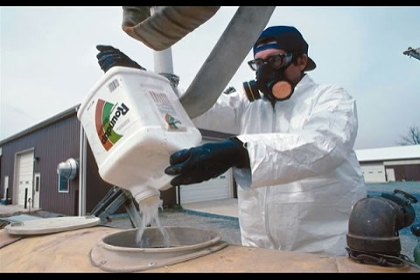
UN/WHO Panel in Conflict of Interest Row Over Glyphosate Cancer Risk
Chairman of UN’s joint meeting on pesticide residues co-runs scientific institute which received donation from Monsanto, which uses glyphosate
May 17, 2016 | Source: The Guardian | by Arthur Neslen
A UN panel that on Tuesday ruled that glyphosate was probably not carcinogenic to humans has now become embroiled in a bitter row about potential conflicts of interests. It has emerged that an institute co-run by the chairman of the UN’s joint meeting on pesticide residues (JMPR) received a six-figure donation from Monsanto, which uses the substance as a core ingredient in its bestselling Roundup weedkiller.
Professor Alan Boobis, who chaired the UN’s joint FAO/WHO meeting on glyphosate, also works as the vice-president of the International Life Science Institute (ILSI) Europe. The co-chair of the sessions was Professor Angelo Moretto, a board member of ILSI’s Health and Environmental Services Institute, and of its Risk21 steering group too, which Boobis also co-chairs.
In 2012, the ILSI group took a $500,000 (£344,234) donation from Monsanto and a $528,500 donation from the industry group Croplife International, which represents Monsanto, Dow, Syngenta and others, according to documents obtained by the US right to know campaign.
Alan Boobis said: “My role in ILSI (and two of its branches) is as a public sector member and chair of their boards of trustees, positions which are not remunerated. The boards of trustees are responsible for oversight of the organisations and their scientific programmes.”
But the news sparked furious condemnation from green MEPs and NGOs, intensified by the report’s release two days before an EU relicensing vote on glyphosate, which will be worth billions of dollars to industry.
Vito Buonsante, a lawyer for the ClientEarth group, said: “There is a clear conflict of interest here if the review of the safety of glyphosate is carried out by scientists that directly get money from industry. This study cannot in any way be reliably considered when deciding whether to approve glyphosate.”
The Green MEP Bart Staes said: “The timing of the release of this report by the FAO/WHO could be described as cynical, if it weren’t such a blatantly political and ham-fisted attempt to influence the EU decision later this week on the approval of glyphosate.”
The WHO says that from its side, the timing of the report’s release so close to the EU decision was coincidental, and was decided several months ago.
The debate over glyphosate, the most widely used herbicide in human history, has become a lightning rod in Brussels, because of its widespread use with crops genetically engineered to resist it. Its use has also been led to reports of associated damage to human health, nearby flora, insects and animals.
